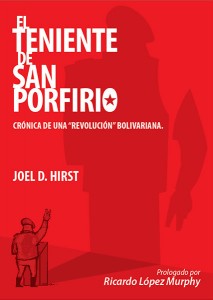Español“I write to better reflect.” This is the thought of Joel Hirst, author of The Lieutenant of San Porfirio — which I found on his blog — and no other phrase could better describe the feeling I had after reading the novel.
The Lieutenant takes place in Venezuela under the rule of Chávez, at a time when “the Commander” is in all his glory, both politically and physically. He is not yet a terminal cancer patient who cries before the cameras. On the contrary, he is the charismatic leader who in the name of “humanitarianism” denigrates — in all ways imaginable — the “enemies” of his revolution, and who in the name of “harmony” points fingers at the social groups (homosexuals, Jews, the middle class) that should be destroyed by the “pure.” He is still the leader who, in the name of his “peaceful revolution,” incites violence and the annihilation of the “oligarchs.”

For Hirst, it was not enough to help alleviate hunger in developing countries. As a member of the so-called First World, Hirst also wished to understand — an unusual attitude. Indeed, this novel shows many hours of deep reflection on the living conditions of the lower classes of Third World nations, even if it addresses Venezuela specifically.
But it doesn’t stop there; this book goes a step further: Hirst strives to uncover the hidden roots of underdevelopment, amid the legacy of privilege, discrimination, and injustice. He also includes an analysis of why the history of Latin America is one of ongoing frustrations, with every so often the rise of a protector, savior, or leader of the poor, who eventually plunges those people into an abyss deeper and worse then what they had before the onset of these “vigilantes.”
If Hirst believes that writing helps one to better understand complex realities, it is fitting that his first work has been a novel. Literature allows someone to convey his deepest thoughts — both sociological and psychological — in a more complete way than any other human science.
That’s because the author — a searcher of souls, of characters — fashions fictional realities, which grant him the freedom to delve into those aspects that he believes to be the most important. This novel possesses adequate room for such a proposition.
In regards to its literary style, this novel fits into the magical realism subgenre, along the lines of a typical Latin-American dictator novel. Hirst writes with fluid style; the plot is interesting; and the characters are well-developed, even if at times they come across as a tad cartoonish. This combination of features allows the novel to retain the reader’s attention.
The critical examination of the phenomenon of Chavismo is performed via two different dimensions. On the one hand, he analyzes the position of certain people in developed countries who look favorably upon these leaders. These individuals pose as “humanitarians” and proclaim to “suffer with the fate of the poor in Latin America.” They justify mass movements like Chavismo, with its evident violations of the most basic human rights and the rule of law, in the name of the “injustices” — real or perceived — that the lower classes suffered through in the past. These individuals, he explains, engage in “revolutionary tourism,” and completely ignore the reality of the country — often with an inferiority complex.
Hirst represents this type of human being with “Freddy,” the US American who travels to Venezuela for a couple of days and is convinced he has known the reality of the nation “from within.” He believes that in such short time has created bonds of brotherhood with the “wretched of the earth.” Then he takes the plane to return to his home country. That is, he returns to the comforts and legal guarantees that his country provides yet he proclaims to despise.
The remaining characters represent different human archetypes: the oligarch, the student leader, the military man who does not mind torturing others — as long as he can accumulate merits and prevent himself from being poor once more — people in poor barrios in the hills of Caracas, and loyal fans of “the Commander.”
However, everything I’ve mentioned so far appears in the works of other authors as well. The unique element of this novel is a crucial moment when a Chavista rally and an anti-Chavista rally are about to confront each other on a highway. In that moment, the voice of “Pancho,” the student leader, rings loudly and explains the reasons why they can’t back down from their quest to fight for individual liberty. In his speech, we can hear the echo of the ideas invoked in a similar situation by John Galt, the main character of Atlas Shrugged, the magnum opus of Ayn Rand.
At first, it felt like déjà vu, and then the surprising and truly original part of the novel comes along: the counter-discourse of “Geronimo,” one of the Chavista leaders. We witness the clash of two powerful speeches: on the one hand, Pancho exposing the uncomfortable and politically incorrect truth, one that no one dares to say out loud; on the other hand, Geronimo, exposes half truths, appeals to primitive emotions, to the most irrational part of human beings in order to transform the most peaceful humans into ferocious beasts. Be that as it may, these words are often considered morally pure.
In his own words, the author sought to better understand the phenomenon of Chávez and Chavismo. But in doing so, he also made a master’s autopsy of any mass movement, be it Nazism, Peronism or socialism of the XXI Century.
The Lieutenant of San Porfirio by Joel D. Hirst is available via Amazon in Spanish and in English.
Translated by Isabella Loaiza Saa.
 Versión Español
Versión Español












